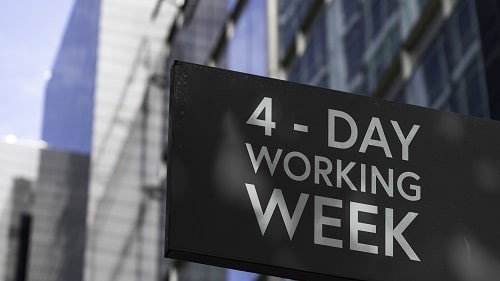In 1907, William Willett campaigned for a simple but significant addendum to time. Having noticed an imbalance of daylight in the summer, he proposed ‘savings’ to preserve liveable post-work hours. If everyone, in sync, agreed to adjust their watch a few times per year, this simple expedient would “make for health and strength of body and mind”. It caught on. The 4 Day Week Campaign has a simple, not dissimilar, objective.
Opinion
Why a four-day week boosts workers’ wellbeing, productivity and loyalty
We advocate a unanimous four-day working week in the United Kingdom. The reasons to support such a cause are inevitably nuanced and personal, yet of the many benefits of the four-day week, one is paramount – the health and wellbeing of workers.
Most employees are on-side. Employers, however, can view the change as undesirable for the perceived new trade-off of 80 per cent commitment for 100 per cent salary. The core mantra for us, however, is that people will not only do the same amount of work in four days compared to five, but more.
 Photograph: iStock/Adam Webb
Photograph: iStock/Adam Webb
The benefits for companies who embrace this simple expedient include newfound robustness, improved confidence, smarter working, and the safeguarding of efficiency. Often once such policies have been considered and implemented, it’s inherently a catalyst for increased dynamism, self-assessment and flexibility. Rejuvenation is essential to pre-empt disruption and avoid entropy.
Success of the four-day working week pilot
The 2022 UK four-day week pilot, considered to be the largest of its kind, was a resounding success. Involving 61 companies and nearly 3,000 workers, participating organisations saw improvements to their overall productivity, staff recruitment, retention and, in some instances, profitability. Employees saw major improvements to their work-life balance, job satisfaction and their physical as well as mental health. What is more surprising, perhaps, are reports of better-quality social interactions with friends and family. As staff feel less stressed, have lower rates of burnout and are overall better rested, they can offer more to the workplace and enhance their personal relationships.
The increased leisure time also provides the added benefit of allowing people more time to engage in the joys of life; spending time with loved ones, pursuing hobbies, learning new skills, immersing oneself in nature or engaging in much needed “self-care”. The mere freedom of an additional day away from the workplace, to spend in any way one may choose, can, and does, greatly enhance an individual’s life fulfilment and satisfaction.
One year on from the initial assessment of the trial, the evidence shows these benefits were long-lasting and can improve over time. A recent report revealed that, of the participating companies, 100 per cent of CEOs and project managers surveyed said the four-day week has had a positive impact on their organisation. Furthermore, 82 per cent said it had a positive impact on their staff, 46 per cent reported positive changes to the way their organisation worked, 50 per cent saw improvements to staff retention and 32 per cent cited the four-day week as having an improvement on recruitment.
As a result, it is of little surprise that 89 per cent of the participating companies have continued with the four-day week and 51 per cent have done so on a permanent basis.
Introducing a four-day working week
Introducing a reduction in working time can be a daunting task; especially while simultaneously overcoming the misconception that guides our economy – more hours worked equals greater productivity.
The first and most important step is to consult with staff. Communication has been the crucial difference between examples of greatest success compared to cases where a top-down approach has been taken. With insufficient staff consultation, the four-day week hasn’t taken root or has been abandoned altogether.
Once staff have been consulted, the next step should be research. As the four-day week gains in popularity and more trials take place, there are many case studies, and most will find at least one helpful example in their sector. Whether successful or not, case studies provide a wealth of knowledge about what might work and what could be replicated.
These trials are also challenging the misconception that some may hold that the four-day week is ‘not for them’. Indeed, it can be fairly said that implementing a four-day week for office-based roles with no public-facing aspect is far easier than in construction or hospitality. That is not to say it can’t be done, as we have found. Once an organisation has committed to prioritising the health and wellbeing of their employees there is always a way to make it work.
Different four-day week models
When researching past examples, it is useful to consider the varying four-day week models that can be adopted. Other than reiterating the benefits of the working time reduction, the common takeaway from pilots has been that adoption of the four-day week will look different depending on the organisation, and there is no “right” way to do it. The four-day week at a non-profit organisation with predominantly office-based roles will be very different from the four-day week at a fish and chip shop.
While the ‘Friday off’ model is often seen as the ‘holy grail’, organisations considering a four-day week should think about what will work best for them, their staff, their workload and, if necessary, their clients. ‘Friday off’ isn’t always possible, and four-day week organisations are making it work for them through an array of different models, and by challenging their preconceptions about what a four-day week looks like.
 Aliyah Davies is a campaign at 4 Day Week Campaign. Photograph: 4 day Week Campaign
Aliyah Davies is a campaign at 4 Day Week Campaign. Photograph: 4 day Week Campaign
Even with all the background research done, there can be no guarantee that adoption of the four-day week will be without complication. There will undoubtedly be unforeseen hurdles that require tweaks along the way. This is not a leap of faith. A trial is the best first step on the road to adoption, even through low commitment initiatives such as 4ugust (a new initiative from the 4 Day Week Campaign and think tank Autonomy, where companies are encouraged to give their staff a four-day week, while keeping salaries the same, for the month of August, therefore acting as a mini-trial of a four-day week). A trial serves as the perfect opportunity to consider how your organisation can work smarter and achieve improved output in shorter hours.
So why, if this is so great, would everyone not pursue its adoption? Well, people are busy. It’s a lot to consider logistically. Alongside a status quo bias, in many industries the precedent is simply not there. All more than understandable points. Furthermore, while many sectors already function asynchronously, there are sometimes more rigid macrostructures to be considered, like demand quotas or adherence to financial markets. Alongside the ‘risk’, it’s seen as an unnecessary disturbance to convention.
Misconceptions around the four-day week
The prime misconception with this structural shift is that people are lazy and want to work less. This completely misses the point – accountability and standards remain the same as before, with output, similarly, unchanged. Even if a company or the public sector trials such change and decides not to keep it as policy moving forwards, we find they inevitably discover much about the inner workings of their organisation, discover newfound flexibility, and have a renewed outlook.
Creating loyalty among teams
In our opinion, not taking part in such experiments would be at least as risky as taking part. Those willing to take a long-term perspective stand to gain significant competitive advantage by upsetting consensus and creating loyalty among their valued teams. As wages continue to stagnate and opportunities dwindle it is not difficult to see the leverage in recruitment and retention that new ways of doing things, like a four-day week, would provide.
We see healthier, happier people. We see more productive people. We see people more invested in things they choose to do. The four-day week is a win-win-win for the economy, employers and the environment. We lose nothing and gain substantially.
There is no loss of control, or ceding of power – in fact, a simple shift in perspective creates trust and brings people together. The 4 Day Week Campaign represents a fascinating step in the right direction, the first of many. A new foundation from which we can build outwards.
Samuel Hunt is business network coordinator and Aliyah Davies is a campaigner at 4 Day Week Campaign.
For more information on the 4 Day Week see:
OPINION

Is workplace health safe in 2026?
By Kevin Bampton, BOHS on 10 February 2026
UK Government efforts to boost the economy and employment levels through approaches such as deregulation pose a serious threat to the country’s workplace safety standards and the health of our workforce.

How stress and burnout will shape the workplace in 2026
By Charlotte Maxwell-Davies, Mental Health UK on 09 February 2026
Burnout is rapidly becoming one of the nation’s most significant workplace challenges. It is emerging as a defining issue for organisations and wider society, as the UK contends with a long-term sickness crisis driven by poor mental health. Stress can be motivating in short bursts, but when left unmanaged it contributes to work absences and lost productivity, as well as presenting a clear risk to the health of workers.

A new year, a new approach to risk?
By Mike Robinson FCA, British Safety Council on 02 February 2026
The rulebook is becoming obsolete faster than we can rewrite it. While bureaucracies labour to update yesterday’s regulations, the world of work transforms daily.



